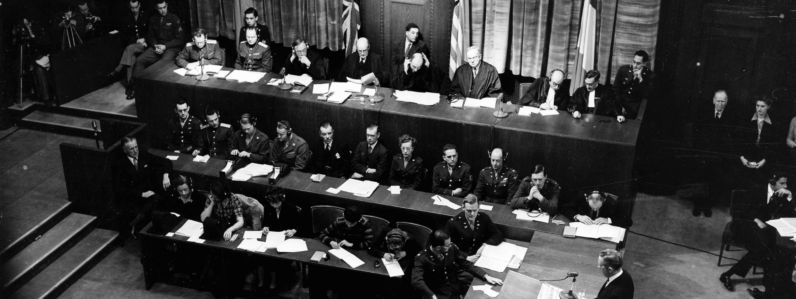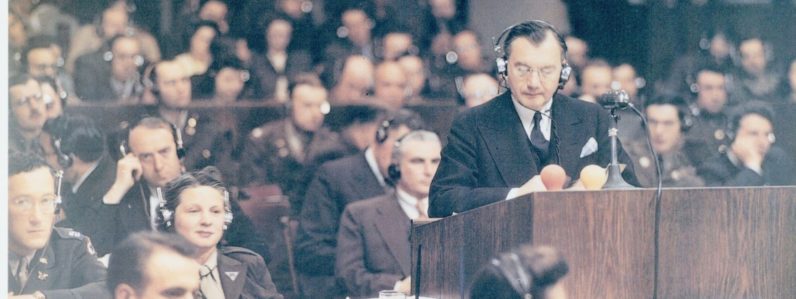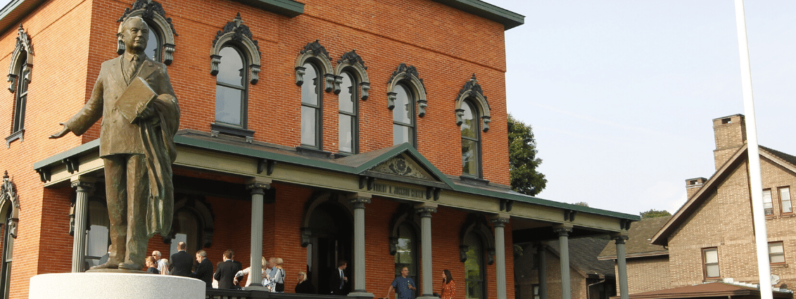On Monday morning, February 23, 1942, Justice Robert H. Jackson delivered the following speech in Buffalo, New York, at the University of Buffalo’s (UB’s) 42nd annual midyear convocation (commencement). The ceremony was held in UB’s Edmund Hayes Hall before almost 1,000 persons, including sixty-five degree recipients. Justice Jackson gave this speech half way through his first year as a Supreme Court justice and just twelve weeks after Japan's devastating surprise attack on Pearl Harbor. He spoke to his Buffalo audience of Americans’ failure to grasp the drift of the world and the threat of Nazism, of the massive military struggle underway worldwide, and of the need for the U.S. to take the offensive in seeking to win a peace and a new world order based on reason, justice and personal freedom.
*****
Youth Faces “The New Order”
By Robert H. Jackson
Associate Justice, Supreme Court of the United States
February 23, 1942
I do not find it possible to speak in traditional Commencement form when the world is so upside down. And unless I mistake the spirit of youth, you are eager to come to grips with the tough problems of your lives. You are well aware that you cannot enjoy the freedom to choose your careers and the locations where you will pursue them that we have associated with the college Commencement period of life. Instead, your country has marked out stern work for you to do.
Moreover, the heritage that would normally be yours is today at risk and in peril. The freedom and democracy that have been promised to you are threatened by the tensions and pressures of war, and their survival, though probable, is not beyond question. Whether your citizenship will be of a proud and powerful nation or of a humbled and beleaguered one may well depend on how we handle ourselves over the next few months. The high standard of living which has been regarded as the birthright of an American is certain to undergo a painful reduction, due to shortage of materials and to diversion of our productive energies to armaments. These discomforts and anxieties face you as individuals because your nation is confronted by a grim and fateful choice—the choice between victory and ruin. There are no comfortable in-between choices for us today. Your country and mine is not defeated, but for the first time in its existence, it is on the defensive. In any struggle, to be on the defensive is to be half defeated. Until we recast our whole strategy and carry the fight to grounds of our choosing and begin to drive rather than to be driven, we are an endangered and humiliated nation. But I think it is time to stop whining about the wounds we have received or others that are clearly in prospect and to turn bitter experiences to our account. Grieving with self-righteous hindsight about Pearl Harbor will do us no good unless we recognize that the disaster came, not because Pearl Harbor minds were different from those in Buffalo or New York or Washington, but because Pearl Harbor was so much like the rest of us. Of course, the attack was a foul deed, and we know that foul play is never the strategy of a confident team. I have faith to believe that in the long run it is better to have been the victim of a foul blow than to have felt that our weakness required us to resort to one. I do not believe that the Axis powers have the strength to keep what they have taken by such strategy. I am even more confident that they have not the capacity for conciliation and leadership necessary to consolidate and administer the territory they have overrun. But it must be conceded that they have an incredible capacity to demoralize and scuttle their adversaries. The humiliating fact is that they do not spread desolation by superior numbers or by greater force alone. Hitler’s constant ally has been the gullibility, the indecision, and the smugness of the democratic peoples. It is not comforting to us Americans to realize how completely we have failed to grasp the direction in which the whole world has been drifting and the meaning to us of these changes in our environment. Did we as a people apprehend the significance of the rising tide of Nazism?
Were we not unanimously surprised alike by the disintegration of France and by the virility of Russia? Do we yet know the cost of our contemptuous underestimation of the striking power of Japan? On such subjects it is dangerous to our survival to entertain mass delusions, particularly when they are shared or catered to by so many in leadership. The pattern of self-deception and of indecision is repeated so often in our recent history that it must be considered a challenge to our system of public education as well as to our habits of public opinion-making. As a case study of American delusion, let us take Mr. Hitler’s case. In this connection I must make a confession of personal credulity which prevents me from speaking in any spirit of self-righteousness or criticism of others. In 1935, after a short time in Germany, I came home convinced that Hitler was driving toward war. Military preparation was obvious to a casual and transient observer. Hitler was proclaiming objectives certain to bring him into collision with other powers. A desperate state of affairs prevailed in central Europe—a status quo which could be brought to an end by no existing force except war. I told my alarms to friends. No one trusted Hitler’s intentions, but no one took him seriously. It was pointed out to me that he had no gold reserves and no credit; that his nation was bankrupt and that a bankrupt can’t fight. Now, I did not want to see another world war, and I welcomed that line of argument, and at a distance the German menace grew less ominous to my mind. Pretty soon I was going about saying, “Of course, bankrupts can’t make war, and Hitler is bankrupt.” The fact is that we did not know how to support a war except by orthodox business methods. We assumed that Hitler could not. Our second mistake was like unto the first. As we thought Hitler powerless to wage war, so we thought France well-nigh impregnable. France had an abundance of all the symbols we 3 have come to cherish as a substitute for the realities. She had gold reserves and credit, at least with her allies, and above all, the Maginot Line and lots of two-legged figures wearing uniforms. We never bothered to test the fiber or to note the internal weakness and corruption of the country and the lack of real loyalty to the French Republic by men high in French affairs. We could easily rationalize our failure to penetrate the French façade except for one thing—the paper hanger [Hitler] did see through it.
Our impressions of Russia were likewise grossly wrong. That the sudden attack upon Russia would succeed in six weeks was the opinion of responsibly placed men in America with exceptions so few as to be numerically negligible. Our emotional dislike for communism was transformed into an intellectual hospitality for every discreditable story of Russia and the Russians. We seized upon and eagerly repeated stories that they were poor mechanics; that they did not know enough to oil their tractors; that they had killed off their competent generals; that the people were already in revolt and were ready to embrace any invader who would deliver them from Stalin. Events beyond the control of either country have stood shoulder to shoulder with Russia and, if the democracies of the world are to be saved, they will owe their salvation substantially to Russia. Yet, had the United States tried deliberately to form a policy based on cooperation with Russia, it would have been rejected by public sentiment so emphatically that no administration could have carried it through. Only a year ago any man in public life would have risked his career to speak a favorable word of Russian power because it would have labeled him a fellow-traveler of communism. The public opinion which ultimately governs America was that Russia would be worthless as an ally and contemptible as an enemy. Of course, we disliked, and I for one still dislike, the Russian principles of government, but it is not safe to conclude that because men have confiscated property they cannot organize a powerful state and that because they are Communists they cannot fight a good fight.
The dangers of letting our likes and dislikes do our thinking is sadly demonstrated in the case of Japan. For years, our relations have been characterized by a growing hostility, fed on their part by envy and hatred and on ours by contempt. There might have been nothing ultimately dangerous in this if we had not regarded scorn for the Japanese as the equivalent of their defeat. Goaded by an idea of racial superiority which we condemn in others, we passed around the word that the Japs had slant eyes and could not sight a gun; that they were poor airmen; that they were only superficial imitators; that their planes were man-traps; that their discipline was low; that they had little equipment, and few resources; that their cities were only paper and bamboo structures, pathetically vulnerable to our bombs—that is, if we had any bombs. Details like this were overlooked by many, and for months before the Japanese struck, Washington was seething with pride and arrogance. The price we are yet to pay we do not know.
I suppose no people can attain satisfactory objectivity in its estimate of alien peoples. But the democracies seem to have been much less objective than have their enemies. It is undeniable that Germany, Russia, and Japan have better estimated the internal and the war strength of the democracies than have the democracies themselves. They have been less deceived by us than we have by them. Perhaps one explanation of this dangerous trend lies in the means by which democratic opinion is made. In this country, our newspapers, our radios, our magazines, our book trade, our public speakers, and even to a large extent our pulpit, all depend on a pleased public for the means to exist. The practice of “Tell them what they want to hear” is what begets circulation and audiences and contributions and votes. Regrettably, few Americans can afford the luxury of independent thinking or speaking, in spite of our boasted freedoms of speech and of press. A second tendency which is difficult to reconcile with our security is to temporize on important fundamental decisions; to try always to have our cake and to eat it too. Hitler has counted on this trait of indecision and, however much we dislike him and his ilk, we cannot deny an uncanny capacity to put his bloody finger on our weak spots. At the close of the World War, we were confronted with a choice between two great underlying policies: One was that we go along with the other nations of the world in a cooperative plan for collective security; the other was that we isolate ourselves from commitments to the rest of the world and maintain our own security by our own strength. To follow through on either policy probably would have avoided the worst features, at least, of the present situation, but faithfully to follow either course required that we pay the price of the decision. If we were to go for international security, it meant that we must make important international commitments; if we were to make our isolation secure, it meant appropriations for armaments. We refused to make commitments, which undermined the League of Nations, and then we withheld appropriations, which undermined the Navy and Army.
In a smaller, but equally important, matter of Philippine policy we have been unable to make a decision. Since Mr. [William Jennings] Bryan challenged the wisdom of our entering into the Orient we have debated what to do about the Philippines. The wisdom of the situation was that whatever policy we adopted should be pursued wholeheartedly. One was promptly to pack up our goods and depart from the Orient; the other was to plant ourselves in the Orient with a firmness and a strength that would enable us to stay there. We have done neither, but we have temporized between the two courses, which adds up to the plight in which the American forces under [General Douglas] MacArthur find themselves today. I could multiply indefinitely the instances where our policy was ultimately decided by the drift of events because we were unwilling to shape our own destiny by taking and holding to a decision. It is the unfortunate quality of a decision to do one thing that it nearly always means giving up something else. Lewis Carroll put it: “The more you have of this the less you will have of that.”
After we have made a decision we begin to pay the price and then those arise to tell us that it is not necessary to pay the price, that we do not need to give up so much of this to get at least some of that. Public opinion becomes confused and indecisive. The outstanding accomplishment of the present masters of Germany, Russia, and Japan is that they led their countries into a program of preparedness for war that was not yet in sight and held them to it for years at terrific cost and sacrifice. Contrast for yourselves the firmness of their policy with what you have seen at home.
I have said that your country faces a choice between victory and ruin. Which its fate is to be depends on just one consideration: whether we are willing to pay the price of victory. Put that way, it sounds absurdly simple. We have the resources and we have the manpower, but it is not yet clear that we have the will and the persistence of purpose to put aside things that are comfortable and do the things that are vital. This is not because our people are more selfish than are enemy peoples, but because certain conditions tend to sterilize our effort. First of all, the people of the United Nations are shocked and psychologically on the defensive. Only a quarter of a century ago we came out of the World War with victory. No generation ever possessed the power more completely to reorganize the world, and none ever made a more abortive effort. Within a single generation victory and prestige have vanished and the victors have their backs to the wall with no choice but to hold fast or to go under. Such an experience begets a defensive attitude of mind. We tend to compensate for having underestimated our enemies by overestimating them. Having found ourselves wrong in thinking them negligible, we now tend to think them invulnerable and that the best we can do is to dig in at some point and stop them. This attitude must cease. Our enemies are not supermen or giants. They have for years cultivated intensively a different set of values than have we. They have emphasized discipline, while we accepted freedom; they devoted themselves to hardness and strength, while we were promoting the more gentle ways of democratic life. Although the first advantages in a contest of cunning brutalism are with those whose embrace of its ways is most habitual, we can achieve discipline and hardness of body and the material of modern war. Our foes, however, are not merely disciplined, hard, and equipped. They are also possessed of a fanaticism infecting the civilian mass as well as the soldiery, which makes them suffer perils and privations gladly. Their program is not conceived in terms of mere defense nor in terms of mere preservation of the status quo. The masters of our enemy peoples have stirred the hopes and fervor of the masses and of their youth by the promise of a “new order” in which old griefs and grievances and privations will be no more. The German youth has been made to feel not that the world should do something for him but that he has a mission to do something for the world—the German world—wiping out old humiliations and injustices. He grasps the sword and sets forth on perilous tasks eagerly and fiercely as a crusader to right national wrongs, to break through an encirclement of enemies, to plant the banners of a new and better order of things. This is as true of Japan as of Germany. Of course, we see in it only propaganda moonshine, but let us not forget that it has been real to them—and that is what matters. While there are lately some evidences of weakened German morale, it cannot be denied that this aggressive and alluring ideology has accounted for the zeal and persistence of their war effort. Why is it that our own war effort lacks that intangible but indispensable thing which Justice Holmes once referred to as “fire in the belly”? The truth is that in contrast to the “have not” nations we are comfortable and blasé and smug. As a people we have been favorably located in reference to the treasures and resources of the world that stings people to sacrifice for a crusade. Our condition of relative well being tends to reproduce, I suppose, the pattern so often repeated among nations, among families, and among individuals—of rising through poverty only to decline through prosperity.
Those with whom democracy has dealt most generously have been slow to awaken to the significance of the war. They are comfortable in what they enjoy and have a strong desire to be let alone. This is not difficult to understand, but it is fatal if men to whom the masses have looked for initiative do not supply it now. Also, it is fatal if our war effort does not capture the imagination and the contagious enthusiasm of youth and the fervor of more stolid masses of men and women whose stake is not in already-won possessions but in future opportunity and hope for themselves and their children.
Compared with the war aims which have stirred the Axis peoples, those so far understood by our people have been defensive and nostalgic and sedative. We have had much talk of “defending our way of life” in a context that showed a meaning merely to preserve the status quo. Since there are hundreds who are not satisfied with the status quo to one who is, such an aim would narrow the base of war support disastrously. Looked at coldly and realistically, the material advantages of our organization of society are too narrowly shared to make the status quo a sufficient inspiration to fire the whole people with the kind of zeal which will mean the salvation of the democratic nations. How, then, may we counter the zeal of the enemy? Is there nothing worthy of a like zeal among free men? Of course, there is, and it is something implicit in this war. Do not we, too, want a new world order? Are not we all, rich and poor, young and old, sick of an order characterized by periodic wars? Do we not envision a more just and reasonable scheme of things both for nations and for men? I have known few individuals, and those only shriveled ones, who were not sustained by faith that out of the travail of today will come a better tomorrow.
Our enemies battle for a new order based on submission to the authority of fuehrer and emperor. The individual, even of the dominant race, is to merge all of his energies and purposes into those of the state, and the state is to be too fiercely nationalistic to tolerate other bloods or even gentle faiths, such as Christianity. To make this kind of world the masters of our enemies have put the sword into the hands of their youth. We, too, battle for a “new order” and for a peace that can be founded only on democracy—a virile and militant democracy growing outwardly to embrace peoples who have never known it and growing inwardly among the nations that profess it. It would apply reason and concepts of justice, instead of the torch and the firing squad, to the cure of the world’s ills. The state is conceived to be the instrumentality of the people, not their master, and men are held to have inviolable personal freedom of soul and mind and expression. Material resources are appropriated to the decencies and comforts of the masses of men under modern living conditions and are not consumed merely in feeding the mills of destruction.
We arm our people to win this world order with the franchise, with individual dignity and civil rights—weapons that the Axis dares not put into the hands of its subjects. Through such weapons the old order can be reshaped, and we ultimately can realize all that the Axis promises to its people, and freedom and peace besides. This understanding of our purpose and of our armament for it will mend our defensive attitudes, liberate our energies and let go our common passion for the job ahead. American earnestness and ardor and singleness of purpose will be able to retrieve what seems lost and to establish the mastery of an order of reason and freedom over the threatened one of force and tyranny.






